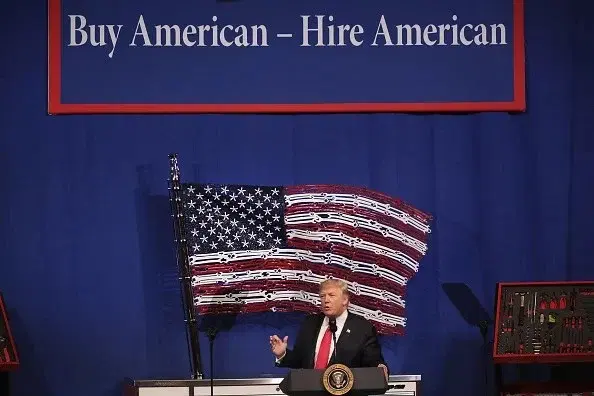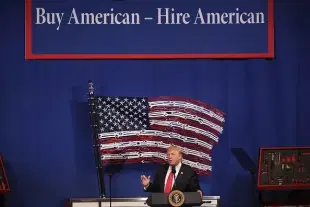News Brief
All The Questions You Had On Trump's H-1B Visa Restrictions—Answered Here
Swarajya Staff
Sep 20, 2025, 11:56 AM | Updated 11:56 AM IST
Save & read from anywhere!
Bookmark stories for easy access on any device or the Swarajya app.


US President Donald Trump signed a proclamation Friday that fundamentally overhauls the American H-1B visa programme by requiring companies to pay a $1,00,000 application fee, representing a dramatic 6,500 per cent increase from the current $1,500 administrative costs.
Here are all the questions you needed answered about it:
What exactly did Trump announce about H-1B visas?
He signed an executive order requiring employers to pay a $1,00,000 fee for each H-1B visa application. This represents a massive increase from the current fees of approximately $1,500.
When does this new fee take effect?
The new $100,000 fee requirement begins on September 21, 2025, at 12:01 AM Eastern Daylight Time.
Who has to pay this $100,000 fee?
The employer must pay the fee, not the worker. Companies sponsoring H-1B visa applications must pay $1,00,000 before they can even submit the application.
Does this affect H-1B workers already in the United States?
Not immediately. The policy only applies to people "entering or attempting to enter" the US after September 21, 2025. If you're already in the US and just renewing your status without traveling abroad, you're temporarily protected.
What happens if I'm on an H-1B and need to travel abroad?
If you leave the US and need a new visa stamp to return, you'd be subject to the new $1,00,000 fee requirement. This effectively traps current H-1B holders in the US if they want to avoid the fee.
How long will this policy last?
The restriction is set for 12 months initially, but Trump can extend it. Within 30 days after the next H-1B lottery, four government departments must recommend whether to continue the policy.
Are there any exceptions to the $1,00,000 fee?
Very few. Only the Secretary of Homeland Security can grant waivers for specific individuals, companies, or entire industries if they determine it's in the "national interest" and doesn't threaten US security.
Which workers will be hit hardest by this change?
Indian workers will be disproportionately affected, as they receive 71-73 per cent of all H-1B visas. In 2024, about 2,07,000 Indians received H-1B visas.
How will this affect tech companies and IT firms?
Major impact expected. Indian IT companies like Infosys, TCS, and Wipro rely heavily on H-1B visas to send engineers to US client sites. American tech giants are also affected - Amazon alone secured over 12,000 H-1B approvals in the first half of 2025.
Can companies get around this by using tourist visas?
No. The executive order specifically directs the State Department to prevent misuse of B (tourist) visas by people with approved H-1B petitions.
What's the practical impact on individual workers?
For a mid-level engineer earning $120,000 annually, the $100,000 visa fee represents over 80 per cent of their yearly salary. While employers pay the fee, this makes companies extremely selective about whom they sponsor.
What happens to the H-1B lottery system?
The annual 85,000 H-1B visa lottery will likely see fewer applications, as smaller companies and new graduates are priced out by the massive fee.
Could this policy face legal challenges?
Possibly. Immigration experts question whether Congress has authorized the government to set such high fees, as they're supposed to only recover the cost of processing applications, not generate revenue.
What's the Trump administration's justification for this change?
Trump officials argue this will protect American jobs and ensure only the "most skilled" foreign workers enter. Commerce Secretary Howard Lutnick said companies should "train Americans from our universities" instead of hiring cheaper foreign talent.
How does this fit into Trump's broader immigration policy?
This is part of a larger immigration overhaul that includes ending pandemic-era interview waivers and creating a "Gold Card" visa for wealthy investors who pay $5 million. The pattern makes entry harder for skilled workers while easing paths for wealthy investors.
What should current H-1B holders do?
Current holders should avoid international travel if possible to prevent triggering the new fee requirement.




